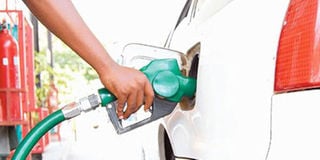Here is how fuel prices are determined

As a general rule, about two-thirds of your cost of fuel at the pump is determined by crude oil cost. PHOTO/EDGAR R BATTE
What you need to know:
Have you ever wondered why different fuel stations charge different prices for the same fuel. In our story today, experts mention some of the factors that will determine fuel prices in different countries.
A visit to Total Najjeera fuel station last week indicates that a litre of petrol costs Shs3,960 while diesel cost Shs3,700. This is the same at Shell Najjeera.
In Najjeera II Trading Centre, Tosha Fuel station sells a litre of petrol at Shs3,850 and diesel at Shs3,550. Our question today is why do different fuel stations sell the same types of fuel at different prices?
Hans Paulsen, the Vivo Energy executive vice president for East and Southern Africa, says like anything else, fuel is also a usable commodity. Its price is not only governed by world prices but that its cost is also determined by the price per barrel of crude oil per day from which it is refined.
For instance, in most cases, a barrel of crude oil costs between $50 to $70, which is the equivalent of Shs185,000 to Shs259,000.
In its crude form after drilling, Paulsen explains that crude oil goes to the refinery for refining at a cost. From the refinery, it then goes to different traders who also trade it at a different cost. It is, thereafter, transported to a port, for example Mombasa and transported either by pipeline or by road or railway, all at different costs.
“From the port through any of the above transport mechanisms, the fuel arrives at a dealer depot where it is handled and kept at a cost. From the depot, in Uganda, it is transported to your nearest fuel station in fuel tankers to different locations, also at a cost. The transporter charges different costs for different locations,” Paulsen explains.
“The cost of fuel will not be uniform to have a litre of fuel cost the same in Arua, Kabale, Mbarara and Kampala. It obviously has to be different because of different locations and different costs of transportation,” he adds.
Local factors
Local factors also come into play as far as the cost of fuel is concerned. These include the cost of doing business in a particular location. These include utility costs such as power, branding, rent of the premise if the fuel station owner does not own the land on which they operate, payment of worker’s salaries, the cost of marketing and distribution, among other factors.
Supply and demand factors
When a particular fuel is in high demand in a given area, the cost may sometimes go up or down. However, in the event that there is low supply of fuel met with high demand, it automatically pushes up the cost of fuel.
There is also a tax component on imported fuel that is announced every year in the national budget. The tax charged on each litre of fuel determines the cost at which you buy the fuel at your local pump. For every litre you buy, there is a proportion off it of tax that goes to government.
Dollar effect
The depreciation of the Ugandan shilling against hard currency (dollar) is one of the factors that determine the cost of fuel.
This, Paulsen explains, is also in addition to the fact that fuel is imported in dollars and is sold in the local currency. It also means the dealer earnings are in the local currency like any other trader who deals in commodities they primarily import.
“The dollar has an impact on the business. It means you are using the weak Ugandan shilling to buy dollars to buy more fuel to sell. The US dollar and the Ugandan local currency do not move in sync. One can go up as the other goes down,” Paulsen explains.
Seasonal and weather effects
According to stlouisfed.org, an online portal, unplanned events such as severe weather and other natural disasters in any of the countries where Ugandan fuel dealers import their fuels can affect gasoline prices. The portal adds that even the anticipation of a potentially destructive event can trigger increased demand and, in turn, increase prices.
“If events shut down refineries or disrupt the supply of gasoline, the reduced supply will tend to cause prices to rise,” the portal states.
So, when you retire to bed in the evening and wake up to a new fuel pump cost at your local station, these are some of the factors you need to understand that determine how much you buy your fuel at.
Does government set fuel prices?
The extent of state intervention in the energy markets differs considerably across countries. There are various forms of fuel market organization and methods of fuel pricing.
So government cannot control prices or wages. It can raise fuel prices through import duties, environmental regulations, and various kinds of taxes. If a government has total control over exports, it can control fuel prices in other countries by controlling how much oil it allows to be exported.
www.globalpetrolprices.com




